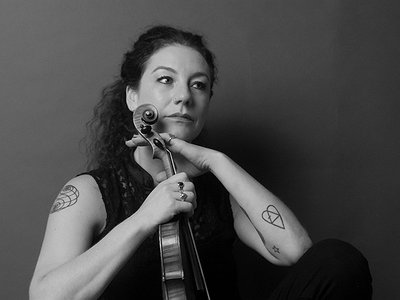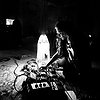Part 1
Name: Jessica Moss
Nationality: Canadian
Occupation: Violinist/Composer
Current Release: Entanglement on Constellation Records
Recommendation: Jerusalem in My Heart/ Fiver (Simone Schmidt)
Website/Contact: If you enjoyed this interview with Jessica Moss, visit her website www.jessicamoss.net for more information visit the Constellation tour page for upcoming shows.
When did you start writing/producing music - and what or who were your early passions and influences?
I’ve been playing violin since I was really little. It was my mom’s idea. She grew up playing cello and felt very strongly that having music as part of an education was invaluable, so she started me on violin and my sister on piano. Even as a kid it was clear that I had a deep passion for the music and a good ear, but at the same time a rebellion to learning the rules and practicing the way and the amount that you were supposed to do. My mom and I used to fight about it daily for years until she finally gave up when I was 12 and said ‘FINE! QUIT!’ and it was then I realized I had fallen in love with it in my own way, and chose to continue on my own terms. I joined bands really early, starting at about 14, and left the classical world behind completely. I think because I had side-stepped most of the theory practice and could essentially only play by ear, I found playing in bands really natural and exciting, like I had come home.
But all through my childhood there was a near constant presence of beautiful classical music, and there were certain pieces that as a kid I responded to in a really deep and emotional way. Scheherazade, Massanet Meditation from Thais, Vaughn Williams Fantasia on a theme by Thomas Thalis, the second movement of Beethoven’s 7th.. are all examples of the highly lyrical pieces I adored as a kid. I would listen and see pictures, stories, colours and feelings, sometimes be brought to tears by the emotions or ideas I would have while listening. I realized a few years ago that certain of those early passions had made a very lasting impact on me and can draw direct lines from what I am doing now to what I loved back then.
What do you personally consider to be the incisive moments in your artistic work and/or career?
I have a hard time thinking about what I do as a ‘career’. I don’t mean that self-deprecatingly, I just don’t tend to think in a linear way, about anything really. If I think about moments that have lead to other moments that I consider ‘important’ throughout this life of playing music, I usually think of people I've encountered that I’ve had things to learn from… and there have been so many of those. Outside of my direct Silver Mt Zion/Constellation/Hotel2Tango family, with whom and by the grace of I’ve definitely learned and experienced the most, I think of this list (incomplete!) of people I’ve collaborated or worked with/alongside that have set my mind in motion in invaluable ways: Carla Bozulich, Jem Cohen, Matana Roberts, Chad Jones (Frankie Sparo), Guy Picciotto, Massimo Pupillo, Jim White, Melissa Auf Der Maur, Ben Shemie, Vic Chesnutt, , Thighpaulsandra, holy how the list could go on…
What are currently your main compositional- and production-challenges?
My main challenges in life in general come from a bad combination of wanting to do everything and having a really hard time forcing myself to sit down and learn the basics and rules of anything new. So I barge in until I encounter technical problems that can make me want to throw my violin or computer or self out the window… but of course those challenges are also often the moments that, once I have actually solved the problem, become the basis for new tools and elements I can bring to whatever I set out to do next.
Also I am fortunate to work with an incredibly patient and talented engineer (Radwan Ghazi Moumneh) who understands where I’m coming from and has dug me out of plenty of technical conundrums.
What do you usually start with when working on a new piece?
Usually when I am lucky enough to find myself with the time and space to devote to working on new music, (rare times indeed) it will start with a concept or a story and/or a melody/melodies that I’ve already been turning over in my mind for some time in quiet moments. I can get quite far just in my mind on an idea I’d like to work on before ever touching the instrument.
When there’s time I will spend hours in the jam space playing whatever comes out of me, and I record everything I do. After I leave the space, I will listen to all of it, many times, and will decipher ideas, melodies, note combinations or soundscapes that seem to resonate or stick with me in some way. Then I will go back with those parts in mind, and start the process again until I have honed a collection of elements that I feel tell the story I have set out to tell, and then I commit to them. After that it becomes a process of whittling down and seeing how precise I can make each element. The studio recording usually comes next, in the middle part of the process. I will record each component separately then take them away with me, and begin the computer part of the work, which can take months, where I add the pieces back together and put them through another many rounds of meticulous editing. Then, finally mastering, when you are supposed to be really done, but you can bet I have put Harris through the ringer making tiny last minute changes even then…
How strictly do you separate improvising and composing?
I do not separate them at all, as improvising is the only way I come to “compositions”; in quotes because i don’t really imagine it as traditional composition, in that i never write any of it down, I never have. (Actually the truth is that 9 times out of 10 I will have no idea what note I am playing or what key it is in, or if it is in fact even in a key at all since I don’t really know much about keys in the first place)! Occasionally for recording purposes I will make diagrams or maps, but mainly to be able to explain the unconventional way in which I like to record.
The pieces themselves though, once they are finished, are composed. I am extremely picky about each phrase and note and utterance, each has been considered and thought through and probably tried in several different ways before I am satisfied.
How do you see the relationship between sound, space and composition?
Well.. I can think of a few ways to answer this question. One, which may sound odd, is that I will not consider a piece ‘done’ until when I listen back to it I get a certain visceral reaction from my brain (which I’ve actually never tried to describe before...) that I can best explain as ‘creating space’ in my mind. Maybe as opposed to ‘taking space’... like somehow each of the pieces of the puzzle that I have worked so hard on, are now fitting together in such a way that it seems to take on a life of its own, creating space of its own.
Another way to answer the question is to think about the live performance element, as for me it feels the most crucial part of what I do. I feel what I am striving for up there on stage is to create a space, along with the audience, for some kind of communion. A collective experience. Because I find those to be real, valuable moments in our lives.
Do you feel it important that an audience is able to deduct the processes and ideas behind a work purely on the basis of the music? If so, how do you make them transparent?
I make a point of speaking to the audience at every show, to explain a bit about the thought processes that went into creating each piece. It’s not always comfortable, and I’m not always that good at talking and sometimes end up feeling like a giant nerd, but it feels integral to what I am doing and I’ve had enough positive feedback on this practice that I’m encouraged to keep at it. I do this for many reasons, partly to create context for music that has few words, partly to entreat the listeners to join me on these long journeys, as once I begin I usually don’t stop again for 20 plus minutes, and partly to completely humanize myself and attempt to break down barriers that can seem to naturally exist between performer and audience. And to open doors to be spoken to as well. I find that it does seem to create an atmosphere in which people tend to feel comfortable talking to me after the show, which I value greatly.
That being said, I have also supremely enjoyed concerts by performers who never address the audience, would never, come on stage and leave again in a shroud of mystery and I can love that too! It really depends on what the artist’s intentions are.






